#disability in history
Text
A throwaway line in Everitt’s Cicero raises so many questions for me:

“Dull-witted” seems to imply what we’d now call a developmental disability. Was this common for consular candidates? Did the constant intermarrying among the Roman aristocracy make disabilities more frequent, as in the Habsburg dynasty? How did the Roman voters view disabled candidates? Was the force of aristocratic connections or wealth enough to get someone elected despite a disability?
I didn’t get the impression that the Romans were kind to disabled people in general - like how Claudius was rejected by his mother, and Octavian’s chronic illnesses may have been fodder for people accusing him of cowardice and unmanliness. But social class can intersect with that in surprising ways. Now I want to read more about it...
2 notes
·
View notes
Video
youtube
The Sad Tale of America's Favorite Bearded Lady | Annie Jones Elliot
6 notes
·
View notes
Photo
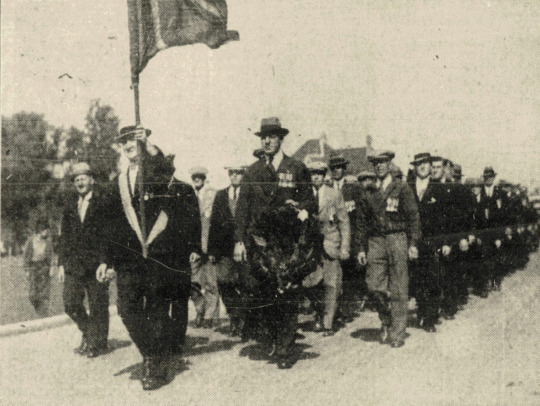
“Winnipeg’s Canadian War Disability Pensioners’ Association (CWDPA) formed in December 1932 in the wake of the relief cut. With 7,446 pensioners in Manitoba and 1,169 in the provincial capital, by May 1933 the CWDPA boasted 800 Winnipeg members. The CWDPA facilitated the creation of and affiliated with pensioner bodies in other urban centres—by 1937, their combined membership totalled 22,000 out of approximately 80,000 Canadian pensioners. Whereas the Legion’s motto, coined by Canadian Corps Commander, Lieutenant-General Arthur Currie, stressed the honour of continued service—“They served till deat —why not we?”—Canada’s pensioner associations adopted the Three Musketeers’ slogan of solidarity—“all for one, and one for all.” As Craig Heron has suggested, it was “comradeship,” the common cause of protecting their rights, and “a belief in collectivist social responsibility and a challenge to any vested interests that threatened the common good,” that brought veterans, like those within the CWDPA, together.
The CWDPA’s political activity revolved around Deer Lodge Hospital. Military hospitals are the “locus classicus of the disabled veteran’s identity,” according to international historian David A. Gerber. It was within these rehabilitative institutions that disabled veterans “developed intense interpersonal relationships,” and formed “self-conscious groups” and “formal organizations.” The “disparity between rehabilitation propaganda and the reality of disability,” provided the backdrop for individual acts of resistance in US institutions, reveals Ana Carden-Coyne; “neither grateful nor compliant,” many US and Canadian disabled veterans rejected the coercive, authoritarian, and infantilizing aspects of military hospitals. Beneath the dominant portrayal of harmony between medical staff and disabled veterans there seethed an animosity and rebuke of the efficacy and promise of rehabilitation.
One of eight Canadian veterans’ hospitals, Deer Lodge was also the DPNH’s administrative centre in Manitoba. Formerly a hotel, the lodge was managed by Major John Payson Oliver, a civil engineer and military officer. Located in Silver Heights, St. James municipality, six kilometres west of downtown Winnipeg on Portage Avenue, the three-storey, Tudor-revival lodge resembled a bucolic English inn, with latticed windows, exposed beams, and a wraparound verandah. The building was surrounded by landscaped gardens, stately oaks and maples, and overlooked the Assiniboine River. During the 1930s the Lodge typically housed up to 150 veterans and admitted an average of 1,074 patients a year. Pensioners convalesced, sought medical aid, collected their pensions and relief, and died at Deer Lodge. The CWDPA recruited patients to the association and regularly gathered in lodge halls. As in the US, the CWDPA’s emergence within Deer Lodge was a collective manifestation of disabled veterans’ indictment on the limits of the modern science of rehabilitation and its welfare apparatus; government interventions had not helped all war survivors to “move on.”
Samuel Sykes, CWDPA president from 1933 to 1937, was no stranger to Deer Lodge. A carpenter by trade, Sykes enlisted in February 1916. At Vimy Ridge, a piece of shrapnel entered behind Sykes left ear, broke his upper jaw and exited below his right eye. For 17 months, Sykes ate food through a straw. During his recovery at Deer Lodge, Sykes survived influenza; his wife and two-year-old daughter did not. Radicalized by his hospitalization, family tragedy, and the postwar depression, Sykes emerged as a One Big Union (OBU) radical. As a labour activist, Sykes organized barbers, retail clerks, and meat packers, and represented streetcar employees
Sykes’s antiwar and socialist leanings coloured CWDPA initiatives. At a 1925 Armistice gathering, Sykes “drew a vivid picture of conditions … on the battlefields.” And for what?, Sykes asked. A country full of “half-starved widows and children?” Cenotaphs, charged Sykes, only “cover up the treachery of the capitalist system.” That same year, representing Winnipeg’s unemployed at city hall, Sykes blamed poverty on the exploitation of the “master class.” “Why don’t you go to Russia where you haven’t got capitalism?,” interrupted a city councillor. In a socialist subversion of Anglo-Canadian nationalism, Sykes retorted, “Because I speak English and don’t come from Russia.” Sykes jumped ship from the OBU to the CWDPA after the union became embroiled in controversy for promoting an illegal newspaper sweepstakes. Within the CWDPA, socialist “Commandant” Sykes found that a violated moral economy offered a gateway to veteran radicalism. Sykes belongs in the ever-widening pantheon of interwar leftists who do not fit neatly into the Communist Party of Canada (CPC) versus Co-operative Commonwealth Federation (CCF) paradigm.
Although more militant than the Legion or the right-leaning Army and Navy Veterans, pensioner associations competed with the Communist Workers’ Ex-Servicemen’s League (WESL). WESL’s as many as 40,000 members nationwide acted as a bulwark against Legionnaire anti-Red and anti-labour vigilantism and insisted on the indivisibility of all workers, regardless of war service. With WESL’s first chapter, and eventually its national headquarters in Winnipeg, Manitoba’s capital was a hotbed of radical veterans’ politics. Where WESL’s leadership raised “a radical awareness of capitalist exploitation and a commitment to revolutionary transformation” among working-class veterans, the CWDPA also nudged war survivors to spurn “bourgeois leadership” and move beyond the “quiescent loyalty” demanded by the Legion and the Canadian state.
Invading their turf, Sykes and the CWDPA faced Communist scorn as the CPC fitfully emerged from its sectarian “Third Period,” wherein it lambasted other leftists as enemies of the revolutionary movement. Some CWDPA members, like Captain William Talbot, returned arrows in anti-Red harangues despite sharing many of WESL’s immediate objectives. In 1933, as the CPC tempered its isolationism with tepid calls for a “united front,” the CWDPA and WESL formed an alliance in the short-lived United Council of Veterans.
With Sykes as the chair, the United Council demanded the restoration of the 1932 pension rates, an overhaul of pension administration, free medical attention, 100% pension rate allowances for “burnt-out” veterans and those over 50 years old, and federal relief for all unemployed ex-soldiers. The United Council moved that all relief and pensions be paid from “government military appropriations and the interest on war debts.” Leo Carson, one-time CWDPA vice president, was one of the association’s more outspoken Communist supporters. Seeing “no reason why one who has served his country should come back to Canada the land of plenty and starve,” Carson, a Great War conscript, was among the leftists injured during the June 1934 battle in Winnipeg’s market square against local fascists
On the eve of the Deer Lodge siege, the CWDPA extended their “moral and sympathetic” support to the communist-led On-to-Ottawa trek. In turn, Vancouver’s WESL branches sent letters of solidarity to the Deer Lodge occupiers. This was hardly a surprise as they frequently targeted the Vancouver Shaughnessy Veterans’ Hospital as a site of protest. Communism, in the minds of many interlopers, was much more about tactics than a revolutionary endgame. Deer Lodge camper and ex-corporal Frank Skidmore, a victim of shell shock and a gunshot wound to his face, wrote to the Winnipeg Tribune to declare that it was high time veterans became “communistic” and stage “a mass protest from coast to coast.” Although clearly not run by Communists, on the ground and in the matter of immediate aims and strategy, the CWDPA shared much with Red-inclined Great War survivors
The CWDPA also aligned with the labour movement. Several directors were prominent union leaders. The association critiqued capitalists for excluding disabled veterans from the workforce, employing only able-bodied labourers to “satisfy … their struggle for markets and cash surpluses.” They also protested the misuse of pensioners’ labour by the state. In 1933, the association grieved the “exploitation” of unpaid convalescents who worked part time at Deer Lodge Hospital. These pensioners feared their relief would be cut off should they refuse. In other remonstrations, the association called for the dismissal of Deer Lodge administrators and for the Lodge to be placed under veterans’ democratic control.
The CWDPA’s progressive and inclusive mandate really shone in its interventions on public health and poverty. Throughout the 1930s, the CWDPA grieved the DPNH’s jurisdictional refusal to provide pensioners’ families with health care. Winnipeg granted free medical provisions for its relief recipients in 1934, but pensioners’ families were denied treatment. Ottawa refused to offer the same to veterans on relief. A CWDPA march to the Manitoba legislature in September 1934 calling for family medical treatment won sympathy from the province. The Winnipeg Free Press accused Ottawa of either “callous indifference or the inexcusable entanglements of red tape.”
In December 1934, tragedy struck. H. D. Brittain, former vice president of the CWDPA, lost his five-year-old son Billie to pneumonia. Ex-private Brittain, thrice wounded before a gas attack ended his four years of war service, had postponed a call to the doctor to seek treatment for Billie until he had received his $26 monthly pension. “Why should a war veteran have to ask for charity?” asked the unemployed calendar salesman. In an antiwar and anti-capitalist rebuke, the CWDPA, in its newspaper, The Pensioner, noted the government’s wartime ability to spend “millions of dollars for instruments of death and destruction” and on hospitals to “patch” them up to send them “back to the slaughter,” but it now “refuses to spend a nickel” for medical care for veterans’ children. If “resurrection were possible,” the dead in France would “cry aloud for vengeance at this betrayal of the things for which they fought and died.” Canada keeps its promises to the bondholders, but not, wrote the organization, to its veterans.”
- David Thompson, “Convalescent Comrades: The 1935 Siege of Winnipeg’s Deer Lodge Hospital,” Histoire sociale / Social History, Volume 54, Numéro/Number 110, Mai/May 2021. p. 79-84.
Image is from article. CWDPA 1934 March to Manitoba Legislature. Talbot is the wreath bearer. Source: “Pensioners Remember Those ‘Over There,’” Winnipeg Tribune, September 10, 1934, p. 8.
#winnipeg#military hospital#canadian veterans#canadian veterans in politics#disability in history#disability#military pension#Canadian War Disability Pensioners’ Association#war wounded#war invalids#political protest#veterans' welfare#communist party of canada#one big union#mass resistance#canadian legion#canadian health care system#history of health care in canada#canadian history#academic research#academic quote
1 note
·
View note
Text
The nazis that you see in movies are as much a historical fantasy as vikings with horned helmets and samurai cutting people in half.
The nazis were not some vague evil that wanted to hurt people for the sake of hurting them. They had specific goals which furthered a far right agenda, and they wanted to do harm to very specific groups, (largely slavs, jews, Romani, queer people, communists/leftists, and disabled people.)
The nazis didn't use soldiers in creepy gas masks as their main imagery that they sold to the german people, they used blond haired blue eyed families. Nor did they stand up on podiums saying that would wage an endless and brutal war, they gave speeches about protecting white Christian society from degenerates just like how conservatives do today.
Nazis weren't atheists or pagans. They were deeply Christian and Christianity was part of their ideology just like it is for modern conservatives. They spoke at lengths about defending their Christian nation from godless leftism. The ones who hated the catholic church hated it for protestant reasons. Nazi occultism was fringe within the party and never expected to become mainstream, and those occultists were still Christian, none of them ever claimed to be Satanists or Asatru.
Nazis were also not queer or disabled. They killed those groups, before they had a chance to kill almost anyone else actually. Despite the amount of disabled nazis or queer/queer coded nazis you'll see in movies and on TV, in reality they were very cishet and very able bodied. There was one high ranking nazi early on who was gay and the other nazis killed him for that. Saying the nazis were gay or disabled makes about as much sense as saying they were Jewish.
The nazis weren't mentally ill. As previously mentioned they hated disabled people, and this unquestionably included anyone neurodivergent. When the surviving nazi war criminals were given psychological tests after the war, they were shown to be some of the most neurotypical people out there.
The nazis weren't socialists. Full stop. They hated socialists. They got elected on hating socialists. They killed socialists. Hating all forms of lefitsm was a big part of their ideology, and especially a big part of how they sold themselves.
The nazis were not the supervillians you see on screen, not because they didn't do horrible things in real life, they most certainly did, but because they weren't that vague apolitical evil that exists for white American action heros to fight. They did horrible things because they had a right wing authoritarian political ideology, an ideology that is fundamentally the same as what most of the modern right wing believes.
#196#my thougts#leftist#leftism#jewish#jumblr#actually mentally ill#mental illness#neurodivergent#actually neurodivergent#world war 2#world war ii#history#queer#gay#queer history#pagan#athiest#athiesm#disability rights#communist#communism#socialist#socialism#anti conservative#anti christianity#christanity#christianity#mad pride#madpunk
11K notes
·
View notes
Text
Fat people deserve mobility aids, too. No matter if it's connected to their fatness or not, because having a mobility issue that is connected to one's fatness won't change that they're still fat and still have the issue at hand. Fat people don't deserve to "tough it out" because fatness should be this divine punishment doled out to those who "deserve" it. Fat disabled people deserve to have the peace of mind that they can exist in whatever way is most comfortable and accessible to them
#disability#ableism#ableism tw#fatphobia#fatphobia tw#also if it's an issue solved by weight loss why would you want them to suffer until the weight loss helps wouldn't that DISCOURAGE them?#because if i were suffering the entire time i sure as fuck wouldn't want to keep going for the ~idea~ of it's gonna pay off!!!#also even if they 'made themself disabled' by being fat or anything else that doesn't matter. they're still disabled.#there is no 'good' disabled and 'bad' disabled and you cannot sort people into those categories#for every 'bad' fat disabled person there are multiple 'good' fat disabled people but you can't tell them apart often actually!#because you would have to know the intimate details of their medical history and familial lineage and tbh if you're...#...being a piece of shit to a disabled person because you assume they're guilty until proven innocent i don't blame others for being...#...weary of you and not wanting to be around you. because you've already proven you can't handle the IDEA of complex disabled experience
20K notes
·
View notes
Text
Huge respect to all the disabled archers out there- this is HARD!
Please check out Patreon to support these videos- I have art references in the shop!
5K notes
·
View notes
Text
i just rbed a post about something similar but. i need my white disabled to folks to be more aware of the privileges they have when navigating the healthcare system. every bit of medical ableism one can experience can be made even worse by being a poc. some of us can't threaten to report a doctor to the ethics board, or refuse care from healthcare workers who aren't masking, without jeopardizing our access to care in general or even our physical safety. we are more likely to be seen as drug seeking, or marked as noncompliant, or experience medical abuse and neglect. that's not to say these things don't happen to white disabled people, but i just think it's important to recognize how dangerous receiving medical care can be for disabled poc specifically. please keep this in mind when giving advice on navigating healthcare.
#mj.txt#disabled#disabled poc#black history month#cripple punk#medical ableism#medical racism#medical abuse#lots of tags sorry
5K notes
·
View notes
Text
Happy Black History Month!
It costs 0$ to Repost a Black disabled queer small business! It could lead to my next sale.
I sell pins, stickers, compression gloves, artist gloves, binders, hip braces, wrist braces, compression socks, sports bras & more!




#pinsforsale#pronoun pins#compression gear#online store#artist#cute#artistglove#disabled#disability#cardigan#black history month
2K notes
·
View notes
Text
This is just a not-so friendly reminder to non-disabled people, especially authors, people in fandoms or in media analysis circles: Cripple/crippled is not just a fancy way of faying "badly injured". it's not an adjective you can just throw in to spice up your sentence because you used "injured" or "disabled" too many times in that paragraph, or because you feel like it gives your writing some extra "oomph".
Cripple is a slur.
A slur the physically disabled community has been asking people not to use for DECADES, since at least the 1970's (50 years). It's a slur with centuries of abuse behind it, centuries of being used to justify physically disabled people as less-than, centuries of demonisation, mistreatment, ostracization, and murder.
Some people within the physical disability community are reclaiming it, that's where movements like cripplepunk (also known as crip-punk or C-punk) come from. That's fine, I'm not talking about that. I love the cripplepunk movement and everything it stands for: being unapologetic about our disabilities and not changing ourselves for the comfort or convenience of able-bodied folks. But the people who use it in that context understand the history of the word, they know how it was used to hurt us, and they understand that not everyone in the physically disabled community is comfortable with the use of the word, especially those who were around when someone being labelled as "crippled" was seen as a valid reason to treat them as less than human. They understand the impact of the word.
But If you, as an able bodied person, casually uses "cripple" in your work, at best you are showing your disabled audience that you haven't been listening to us, at worst, you show you don't care about weather we feel safe in the spaces you have created.
And for able-bodied authors specifically, even if your character is physically disabled, I'd still recommend avoiding it unless you're prepared to do a LOT of sensitivity readings from multiple sensitivity readers. I've been physically disabled since I was 1 year old, I learned to walk for the first time in prosthetics and have been using a wheelchair since I was in school, I have no memory of life as an able-bodied person, and even I don't feel comfortable using the word cripple in my work.
It's a loaded word, with a lot of implications and a LOT of very dark, and for some people, very recent history. It's not a sentence enhancer to just throw in willy-nilly. Please.
#Writing Disability with Cy Cyborg#disabled#disability#disability history#ableism#physically disabled#cripple punk#cpunk#actually disabled#physical disability#visibly disabled#visible disability#writing disability#writing#writing community#writeblr#writers of tumblr#authors of tumblr#media analysis#write#c slur#language
3K notes
·
View notes
Text
Queer history and the history of disability are inherently connected. Beyond the myriad of queer disabled people throughout history, the medicalization of queer people has existed for a long time and continues to this day. This means that a lot of the abuses of disabled people have overlapped onto the queer community, and ideally this would give queer people a greater understanding and ability to stand in solidarity with the disabled community. In practice, this often isn’t the case. Eugenicist beliefs, ableist rhetoric, and a deep fear of aging and losing access to an abled body, are all things that run rampant within the queer community. It is past time to do better.
There is so much to learn from the people sitting on the intersection, and the queer people who have been forced through the medical system because of their queerness. Queerness and disability are connected, and that’s a strength for both communities. Within queer history is the history of disability and within the history of disability is queer history. To learn one is to learn the other, and let that be the joy of it.
3K notes
·
View notes
Text
Help Us Take my Service Dog in Training to the Vet!
I am remaking a post for my service dog in training since the last one has stalled. He is growing like a weed! so we need to replace some of his gear already, get him into puppy classes and most important take him to the vet. We have enough for the vet but not enough to get there and back. The cost of an Uber Pet is almost as expensive as the vet visit ($75) so that expense is the most important for right now.

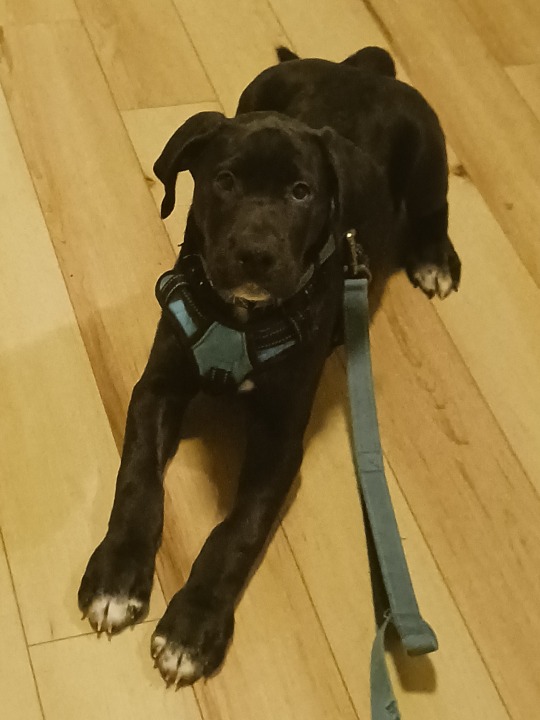
The goal is at $530!
CA: $sleepyhen
VN: wildwotko
Dm 4 P@ypal
#chronically ill#black history month#ehlers danlos syndrome#service dog#disability justice#remaking bc the last post got a lot of traction but not a lot of support#i love my baby boy look at how big he is getting!#he is big but he is only 13 weeks old!
876 notes
·
View notes
Text
Available as an open-access PDF via the publisher or @jstor, this sourcebook takes in a wide range of genres to look at histories of disability in medieval Europe. You can also get a hard copy for under $30 if you feel like supporting an indie publisher. Any royalties are donated to causes related to disability justice.
2K notes
·
View notes
Text
“The economics of veteran pensions and unemployment relief were morally ambiguous. Policymakers, bent by popular opinion and by political promises of erecting a pension system “fit for heroes,” raised expectations of humane and just welfare for returned soldiers. Yet the state’s guarantee to provide for its war wounded collided with competing moral imperatives. Pension administrators and politicians sought to avoid the “pension evil” that had plagued the US government since the end of the Civil War by ensuring, in the words of Ernest Scammell, secretary of the DPNH, that pension legislation afforded a “‘minimum of sentiment … and a maximum of sound hard business sense.’
Internationally and in Canada, rehabilitation programs were the modern solution to avoid the pension evil. A combination of medical interventions, convalescent programs, and vocational retraining, were designed to prevent only the most incapacitated veteran from remaining the state’s ward. Government media campaigns sought to portray the success of their efforts in helping veterans “overcome” their disabilities. As Ana Carden-Coyne has shown in the American context, such “false optimisms” often backfired and acted as a particular infringement of the disabled veteran’s moral economy. Disabled American war survivors resisted when the attempt to rehabilitate them to adapt to Fordist/Taylorist modes of production failed. To counter noncompliance, retraining was often enforced, causing further discontent, as veterans considered the quasi-militarized rehabilitation schemes as little more than a different “form of enlistment.” “American veterans were often critical and even hostile” to medical and state authorities who foisted upon them an enforced and humiliating independence; many Canadian veterans proved equally antagonistic to rehabilitation efforts.
In this way, just welfare provisions were further compromised by the government’s commitment to individualizing the causes of and solutions to unemployment. Veteran welfare may not have been “means-tested,” but it retained the principle of less eligibility. The state’s rehabilitation policies pushed disabled pensioners into the lowest paying and most exploitative jobs available
Pensioners resisted the violation of liberal notions of fairness and equality by drawing upon political impulses born from their economic struggles. Not all pensioners were subservient “bulwarks of the established order,” nor should we assume the Canadian Legion of the British Empire Service League as their political representative. After all, at the height of the Depression, the Legion’s membership did not exceed a third of Canadians who served overseas, and many ex-soldiers had tired of its rigid hierarchy, supplicating posture, and slow and lacklustre appeals on behalf of the workless veteran. The self-serving ways the Legion colluded in tying pensions to medical measurements of an individual’s (in)capacity to participate in the capitalist society, and its exclusionary pleas for rights-based welfare based on an ex-soldier’s patriotism, masculine virtues, and military service, made its moral appeals virtually indistinguishable from the governments from whom it sought favour.
To truly grasp the temper of veterans’ politics in the interwar years, one ought to appraise the demobilized soldiers who joined the workers’ revolts that swept the country in 1919, their independent electoral campaigns and political alliances with labour and farmers, and the populist appeals of the Great War Veterans’ Association and the Grand Army of United Veterans, before the formation of the Legion in 1925 sought to suppress the recalcitrant rank and file and bring them back under the command of an officer class. Disabled pensioners also reacted to their unique injustice by fostering a culture of resistance. Consider amputees George W. Hincks and Marshall MacDougall, who, in 1923, marched over 1,000 miles on wooden prostheses to publicize the poverty of the 4,000 pensioners who had lost limbs during the war. Far from appealing for aid based on patriotism and war service, the left-wing Hincks slandered the royal family and denounced capitalism, war expenditures, and police brutality.
More representative than Hincks are the virtually unknown pensioners’ associations that proliferated in urban Canada during the Great Depression. At their peak, one-quarter of pensioners were active members. Among the first organized disability activists in Canadian history, these veterans challenged the government and medical profession’s individual prescriptions to transform them into economically productive and complacent worker-citizens. For many of these pensioners, the social order, not the individual, bordered on insanity; capitalists, governments, and the able-bodied were selectively blind and deaf to the social causes of their disabilities and their continued marginalization.”
- David Thompson, “Convalescent Comrades: The 1935 Siege of Winnipeg’s Deer Lodge Hospital,” Histoire sociale / Social History, Volume 54, Numéro/Number 110, Mai/May 2021. p. 74-76.
#military hospital#canadian veterans#canadian veterans in politics#military pension#disability in history#disability#Canadian War Disability Pensioners’ Association#war wounded#war invalids#political protest#returned soldiers#academic quote#academic research#canadian legion#canadian health care system#history of health care in canada#great war veterans’ association#canadian history
1 note
·
View note
Text
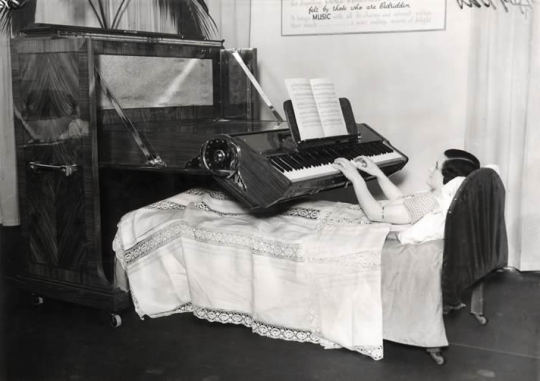
Piano for the Bedridden
#piano#disability#music history#sincerely wish I had one of these#wonder if chopin ever played something like this for George Sand
1K notes
·
View notes
Text
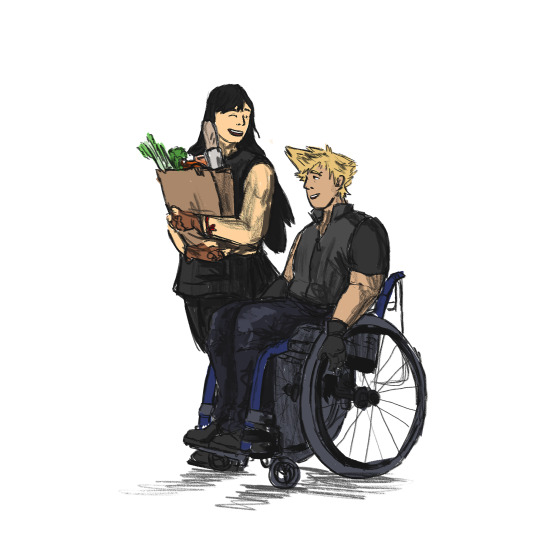
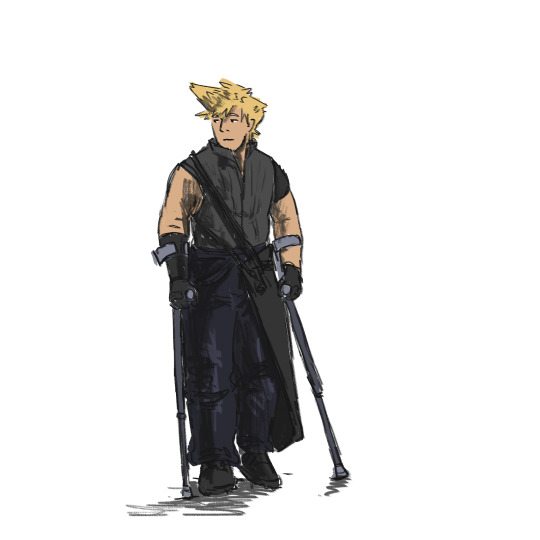
post canon mobility aids cloud save me....save me post canon mobility aids cloud
#ff7#final fantasy 7#cloud strife#tifa lockhart#blue had to send me his advent children outfit for this and i almost died laughing i love you girl what are you wearing#anyways. protagonists being disabled at the end of their stories is important to me. lalallalalaaaaa....#i coulda fixed some of this but im not putting that much effort in. man its a sunday afternnoon who cares#EDIT. SECOND TIME IN RECENT HISTORY IVE FORGOTTEN AN ID??? I may be stupid. its in alt now
424 notes
·
View notes
Text
The Disability Library
I love books, I love literature, and I love this blog, but it's only been recently that I've really been given the option to explore disabled literature, and I hate that. When I was a kid, all I wanted was to be able to read about characters like me, and now as an adult, all I want is to be able to read a book that takes us seriously.
And so, friends, Romans, countrymen, I present, a special disability and chronic illness booklist, compiled by myself and through the contributions of wonderful members from this site!
As always, if there are any at all that you want me to add, please just say. I'm always looking for more!
Edit 20/10/2023: You can now suggest books using the google form at the bottom!
Updated: 31/08/2023
Articles and Chapters
The Drifting Language of Architectural Accessibility in Victor Hugo's Notre-Dame de Paris, Essaka Joshua, 2012
Early Modern Literature and Disability Studies, Allison P. Hobgood, David Houston Wood, 2017
How Do You Develop Whole Object Relations as an Adult?, Elinor Greenburg, 2019
Making Do with What You Don't Have: Disabled Black Motherhood in Octavia E. Butler's Parable of the Sower and Parable of the Talents, Anna Hinton, 2018
Necropolitics, Achille Mbeme, 2003 OR Necropolitics, Achille Mbeme, 2019
Wasted Lives: Modernity and Its Outcasts, Zygmunt Bauman, 2004
Witchcraft and deformity in early modern English Literature, Scott Eaton, 2020
Books
Fiction:
Misc:
10 Things I Can See From Here, Carrie Mac
A-F:
A Curse So Dark and Lonely, (Series), Brigid Kemmerer
Akata Witch, (Series), Nnedi Okorafor
A Mango-Shaped Space, Wendy Mass
Ancillary Justice, (Series), Ann Leckie
An Unkindness of Ghosts, Rivers Solomon
An Unseen Attraction, (Series), K. J. Charles
A Shot in the Dark, Victoria Lee
A Snicker of Magic, Natalie Lloyd
A Song of Ice and Fire, (series), George R. R. Martin
A Spindle Splintered, (Series), Alix E. Harrow
A Time to Dance, Padma Venkatraman
Bath Haus, P. J. Vernon
Beasts of Prey, (Series), Ayana Gray
The Bedlam Stacks, (Series), Natasha Pulley
Black Bird, Blue Road, Sofiya Pasternack
Black Sun, (Series), Rebecca Roanhorse
Blood Price, (Series), Tanya Huff
Borderline, (Series), Mishell Baker
Breath, Donna Jo Napoli
The Broken Kingdoms, (Series), N.K. Jemisin
Brute, Kim Fielding
Cafe con Lychee, Emery Lee
Carry the Ocean, (Series), Heidi Cullinan
Challenger Deep, Neal Shusterman
Cinder, (Series), Marissa Meyer
Clean, Amy Reed
Connection Error, (Series), Annabeth Albert
Cosima Unfortunate Steals A Star, Laura Noakes
Crazy, Benjamin Lebert
Crooked Kingdom, (Series), Leigh Bardugo
Daniel Cabot Puts Down Roots, (Series), Cat Sebastian
Daniel, Deconstructed, James Ramos
Dead in the Garden, (Series), Dahlia Donovan
Dear Fang, With Love, Rufi Thorpe
Deathless Divide, (Series), Justina Ireland
The Degenerates, J. Albert Mann
The Doctor's Discretion, E.E. Ottoman
Earth Girl, (Series), Janet Edwards
Everyone in This Room Will Someday Be Dead, Emily R. Austin
The Extraordinaries, (Series), T. J. Klune
The Extraordinary Education of Nicholas Benedict, (Series), Trenton Lee Stewart
Fight + Flight, Jules Machias
The Final Girl Support Group, Grady Hendrix
Finding My Voice, (Series), Aoife Dooley
The First Thing About You, Chaz Hayden
Follow My Leader, James B. Garfield
Forever Is Now, Mariama J. Lockington
Fortune Favours the Dead, (Series), Stephen Spotswood
Fresh, Margot Wood
H-0:
Harmony, London Price
Harrow the Ninth, (series), Tamsyn Muir
Hench, (Series), Natalia Zina Walschots
Highly Illogical Behaviour, John Corey Whaley
Honey Girl, Morgan Rogers
How to Become a Planet, Nicole Melleby
How to Bite Your Neighbor and Win a Wager, (Series), D. N. Bryn
How to Sell Your Blood & Fall in Love, (Series), D. N. Bryn
Hunger Pangs: True Love Bites, Joy Demorra
I Am Not Alone, Francisco X. Stork
The Immeasurable Depth of You, Maria Ingrande Mora
In the Ring, Sierra Isley
Into The Drowning Deep, (Series), Mira Grant
Iron Widow, (Series), Xiran Jay Zhao
Izzy at the End of the World, K. A. Reynolds
Jodie's Journey, Colin Thiele
Just by Looking at Him, Ryan O'Connell
Kissing Doorknobs, Terry Spencer Hesser
Lakelore, Anna-Marie McLemore
Learning Curves, (Series), Ceillie Simkiss
Let's Call It a Doomsday, Katie Henry
The Library of the Dead, (Series), TL Huchu
The Lion Hunter, (Series), Elizabeth Wein
Lirael, (Series), Garth Nix
Long Macchiatos and Monsters, Alison Evans
Love from A to Z, (Series), S.K. Ali
Lycanthropy and Other Chronic Illnesses, Kristen O'Neal
Never Let Me Go, Kazuo Ishiguro
The Never Tilting World, (Series), Rin Chupeco
The No-Girlfriend Rule, Christen Randall
Nona the Ninth, (series), Tamsyn Muir
Noor, Nnedi Okorafor
Odder Still, (Series), D. N. Bryn
Once Stolen, (Series), D. N. Bryn
One For All, Lillie Lainoff
On the Edge of Gone, Corinne Duyvis
Origami Striptease, Peggy Munson
Our Bloody Pearl, (Series), D. N. Bryn
Out of My Mind, Sharon M. Draper
P-T:
Parable of the Sower, (Series), Octavia E. Butler
Parable of the Talents, (Series), Octavia E. Butler
Percy Jackson & the Olympians, (series), Rick Riordan
Pomegranate, Helen Elaine Lee
The Prey of Gods, Nicky Drayden
The Pursuit Of..., (Series), Courtney Milan
The Queen's Thief, (Series), Megan Whalen Turner
The Quiet and the Loud, Helena Fox
The Raging Quiet, Sheryl Jordan
The Reanimator's Heart, (Series), Kara Jorgensen
The Remaking of Corbin Wale, Joan Parrish
Roll with It, (Series), Jamie Sumner
Russian Doll, (Series), Cristelle Comby
The Second Mango, (Series), Shira Glassman
Scar of the Bamboo Leaf, Sieni A.M
Shaman, (Series), Noah Gordon
Sick Kids in Love, Hannah Moskowitz
The Silent Boy, Lois Lowry
Six of Crows, (Series) Leigh Bardugo
Sizzle Reel, Carlyn Greenwald
The Spare Man, Mary Robinette Kowal
The Stagsblood Prince, (Series), Gideon E. Wood
Stake Sauce, Arc 1: The Secret Ingredient is Love. No, Really, (Series), RoAnna Sylver
Stars in Your Eyes, Kacen Callender [Expected release: Oct 2023]
The Storm Runner, (Series), J. C. Cervantes
Stronger Still, (Series), D. N. Bryn
Sweetblood, Pete Hautman
Tarnished Are the Stars, Rosiee Thor
The Theft of Sunlight, (Series), Intisar Khanani
Throwaway Girls, Andrea Contos
Top Ten, Katie Cotugno
Torch, Lyn Miller-Lachmann
Treasure, Rebekah Weatherspoon
Turtles All the Way Down, John Green
U-Z:
Unlicensed Delivery, Will Soulsby-McCreath
Expected release October 2023
Verona Comics, Jennifer Dugan
Vorkosigan Saga, (Series), Lois McMaster Bujold
We Are the Ants, (Series), Shaun David Hutchinson
The Weight of Our Sky, Hanna Alkaf
Whip, Stir and Serve, Caitlyn Frost and Henry Drake
The Whispering Dark, Kelly Andrew
Wicked Sweet, Chelsea M. Cameron
Wonder, (Series), R. J. Palacio
Wrong to Need You, (Series), Alisha Rai
Ziggy, Stardust and Me, James Brandon
Graphic Novels:
A Quick & Easy Guide to Sex & Disability, (Non-Fiction), A. Andrews
Constellations, Kate Glasheen
Dancing After TEN: a graphic memoir, (memoir) (Non-Fiction), Vivian Chong, Georgia Webber
Everything Is an Emergency: An OCD Story in Words Pictures, (memoir) (Non-Fiction), Jason Adam Katzenstein
Frankie's World: A Graphic Novel, (Series), Aoife Dooley
The Golden Hour, Niki Smith
Nimona, N. D. Stevenson
The Third Person, (memoir) (Non-Fiction), Emma Grove
Magazines and Anthologies:
Artificial Divide, (Anthology), Robert Kingett, Randy Lacey
Beneath Ceaseless Skies #175: Grandmother-nai-Leylit's Cloth of Winds, (Article), R. B. Lemburg
Defying Doomsday, (Anthology), edited by Tsana Dolichva and Holly Kench
Josee, the Tiger and the Fish, (short story) (anthology), Seiko Tanabe
Nothing Without Us, edited by Cait Gordon and Talia C. Johnson
Nothing Without Us Too, edited by Cait Gordon and Talia C. Johnson
Unbroken: 13 Stories Starring Disabled Teens, (Anthology), edited by Marieke Nijkamp
Uncanny #24: Disabled People Destroy Science Fiction, (Anthology), edited by: Elsa Sjunneson-Henry, Dominik Parisien et al.
Uncanny #30: Disabled People Destroy Fantasy, (Anthology), edited by: Nicolette Barischoff, Lisa M. Bradley, Katharine Duckett
We Shall Be Monsters, edited by Derek Newman-Stille
Manga:
Perfect World, (Series), Rie Aruga
The Sky is Blue with a Single Cloud, (Short Stories), Kuniko Tsurita
Non-Fiction:
Academic Ableism: Disability and Higher Education, Jay Timothy Dolmage
A Disability History of the United States, Kim E, Nielsen
The Architecture of Disability: Buildings, Cities, and Landscapes beyond Access, David Gissen
Being Seen: One Deafblind Woman's Fight to End Ableism, Elsa Sjunneson
Black Disability Politics, Sami Schalk
Borderline, Narcissistic, and Schizoid Adaptations: The Pursuit of Love, Admiration, and Safety, Dr. Elinor Greenburg
Brilliant Imperfection: Grappling with Cure, Eli Clare
The Cambridge Companion to Literature and Disability, Barker, Clare and Stuart Murray, editors.
The Capacity Contract: Intellectual Disability and the Question of Citizenship, Stacy Clifford Simplican
Capitalism and Disability, Martha Russel
Care work: Dreaming Disability Justice, Leah Lakshmi Piepzna-Samarasinha
Catatonia, Shutdown and Breakdown in Autism: A Psycho-Ecological Approach, Dr Amitta Shah
The Collected Schizophrenias: Essays, Esme Weijun Wang
Crip Kinship, Shayda Kafai
Crip Up the Kitchen: Tools, Tips and Recipes for the Disabled Cook, Jules Sherred
Culture – Theory – Disability: Encounters between Disability Studies and Cultural Studies, Anne Waldschmidt, Hanjo Berressem, Moritz Ingwersen
Decarcerating Disability: Deinstitutionalization and Prison Abolition, Liat Ben-Moshe
Demystifying Disability: What to Know, What to Say, and How to Be an Ally, Emily Ladau
Dirty River: A Queer Femme of Color Dreaming Her Way Home, Leah Lakshmi Piepzna-Samarasinha
Disability Pride: Dispatches from a Post-ADA World, Ben Mattlin
Disability Visibility: First-Person Stories From the Twenty-First Century, Alice Wong
Disfigured: On Fairy Tales, Disability and Making Space, Amanda Leduc
Every Cripple a Superhero, Christoph Keller
Exile and Pride: Disability, Queerness and Liberation, Eli Clare
Feminist Queer Crip, Alison Kafer
The Future Is Disabled: Prophecies, Love Notes, and Mourning Songs, Leah Lakshmi Piepzna-Samarasinha
Growing Up Disabled in Australia, Carly Findlay
It's Just Nerves: Notes on a Disability, Kelly Davio
The Immortal Life of Henrietta Lacks, Rebecca Skloot
Language Deprivation & Deaf Mental Health, Neil S. Glickman, Wyatte C. Hall
The Minority Body: A Theory of Disability, Elizabeth Barnes
My Body and Other Crumbling Empires: Lessons for Healing in a World That Is Sick, Lyndsey Medford
No Right to Be Idle: The Invention of Disability, 1840s-1930s, Sarah F. Rose
Nothing About Us Without Us: Disability Oppression and Empowerment, James I. Charlton
The Pedagogy of Pathologization Dis/abled Girls of Color in the School-prison Nexus, Subini Ancy Annamma
Physical Disability in British Romantic Literature, Essaka Joshua
QDA: A Queer Disability Anthology, Raymond Luczak, Editor.
The Right to Maim: Debility, Capacity, Disability, Jasbir K. Puar
Sitting Pretty, (memoir), Rebecca Taussig
Sounds Like Home: Growing Up Black & Deaf in the South, Mary Herring Wright
Surviving and Thriving with an Invisible Chronic Illness: How to Stay Sane and Live One Step Ahead of Your Symptoms, Ilana Jacqueline
The Things We Don't Say: An Anthology of Chronic Illness Truths, Julie Morgenlender
Uncanny Bodies: Superhero Comics and Disability, Scott T. Smith, José Alaniz
Uncomfortable Labels: My Life as a Gay Autistic Trans Woman, (memoir), Laura Kate Dale
Unmasking Autism, Devon Price
The War on Disabled People: Capitalism, Welfare and the Making of a Human Catastrophe, Ellen Clifford
We've Got This: Essays by Disabled Parents, Eliza Hull
Year of the Tiger: An Activist's Life, (memoir) (essays) Alice Wong
Picture Books:
A Day With No Words, Tiffany Hammond, Kate Cosgrove-
A Friend for Henry, Jenn Bailey, Mika Song
Ali and the Sea Stars, Ali Stroker, Gillian Reid
All Are Welcome, Alexandra Penfold, Suzanne Kaufman
All the Way to the Top, Annette Bay Pimentel, Jennifer Keelan-Chaffins, Nabi Ali
Can Bears Ski?, Raymond Antrobus, Polly Dunbar
Different -- A Great Thing to Be!, Heather Alvis, Sarah Mensinga
Everyone Belongs, Heather Alvis, Sarah Mensinga
I Talk Like a River, Jordan Scott, Sydney Smith
Jubilee: The First Therapy Horse and an Olympic Dream, K. T. Johnson, Anabella Ortiz
Just Ask!, Sonia Sotomayor, Rafael López
Kami and the Yaks, Andrea Stenn Stryer, Bert Dodson
My Three Best Friends and Me, Zulay, Cari Best, Vanessa Brantley-Newton
Rescue & Jessica: A Life-Changing Friendship, Jessica Kensky, Patrick Downes, Scott Magoon
Sam's Super Seats, Keah Brown, Sharee Miller
Small Knight and the Anxiety Monster, Manka Kasha
We Move Together, Kelly Fritsch, Anne McGuire, Eduardo Trejos
We're Different, We're the Same, and We're All Wonderful!, Bobbi Jane Kates, Joe Mathieu
What Happened to You?, James Catchpole, Karen George
The World Needs More Purple People, Kristen Bell, Benjamin Hart, Daniel Wiseman
You Are Enough: A Book About Inclusion, Margaret O'Hair, Sofia Sanchez, Sofia Cardoso
You Are Loved: A Book About Families, Margaret O'Hair, Sofia Sanchez, Sofia Cardoso
The You Kind of Kind, Nina West, Hayden Evans
Zoom!, Robert Munsch, Michael Martchenko
Plays:
Peeling, Kate O'Reilly
---
With an extra special thank you to @parafoxicalk @craftybookworms @lunod @galaxyaroace @shub-s @trans-axolotl @suspicious-whumping-egg @ya-world-challenge @fictionalgirlsworld @rubyjewelqueen @some-weird-queer-writer @jacensolodjo @cherry-sys @dralthon @thebibliosphere @brynwrites @aj-grimoire @shade-and-sun @ceanothusspinosus @edhelwen1 @waltzofthewifi @spiderleggedhorse @sleepneverheardofher @highladyluck @oftheides @thecouragetobekind @nopoodles @lupadracolis @elusivemellifluence @creativiteaa @moonflowero1 @the-bi-library @chronically-chaotic-cryptid for your absolutely fantastic contributions!
---
Submit a Book:
#disability resources#disability#chronic illness#disability books#books#resources#book list#disability literature#literature#disability representation#disabled characters#information#informative#disability education#disability history#disability rights#please add to this#to be updated#long post
2K notes
·
View notes